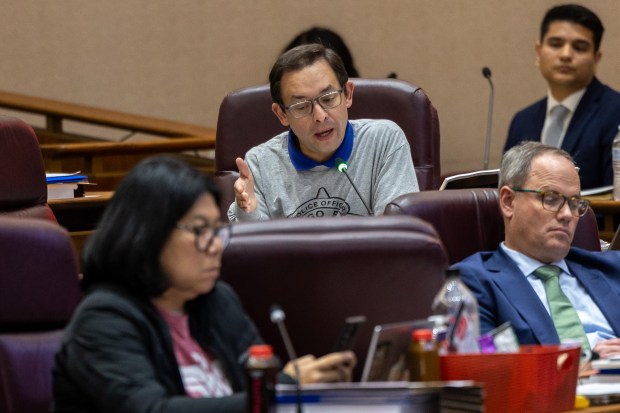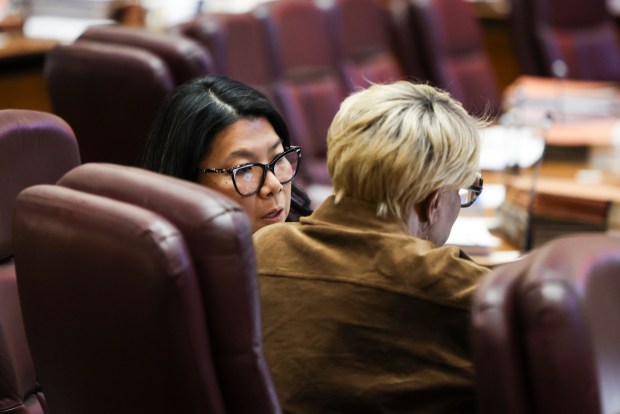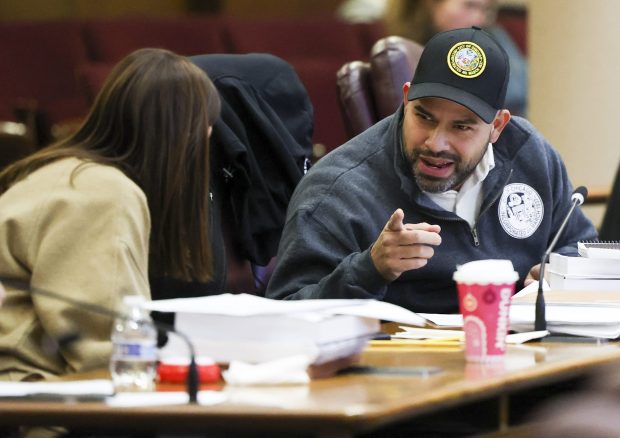Before Mayor Brandon Johnson’s latest bid to secure passage of his 2025 budget plan fell apart last week, his team raced to make up for the past year and a half’s damage to his relationships with aldermen in just a few days.
The progressive mayor and self-dubbed “collaborator-in-chief” resorted (with mixed results) to the kind of old-school horse-trading for budget support that was a hallmark of Democratic machine predecessors, but fell short of a council majority and canceled the up-or-down budget vote Friday morning rather than suffer a historically embarrassing defeat.
Now, with an end-of-year deadline bearing down on him to pass the $17.3 billion spending plan, and holdout aldermen further empowered to demand even greater concessions or sweeteners in exchange for their backing, Johnson has to figure out what to do to persuade a handful more of them to change their minds.
Tick tock.
The latest bevy of backroom negotiations this week did boast a few successful examples of wheeling and dealing reminiscent of Mayors Richard M. Daley and Rahm Emanuel, but apparently not enough to guarantee a Friday victory. So Johnson told the council to come back to try again Monday afternoon.
The freshman mayor who promised bold progressive investments and no property tax increases — only to propose a 2025 budget that satisfies neither — has until Dec. 31 to win a majority of Chicago’s 50 aldermen or risk a historic government shutdown. What happens next is anyone’s guess, but City Hall observers say they already expect the recent chaos that’s dominated Johnson’s second budget process to usher in long-lasting ramifications for Chicago’s political ecosystem.
Even aldermen planning to vote for the mayor’s budget say this latest parade of mishaps could serve to permanently give away the power of the mayor’s office as well as make his next two negotiation cycles that much harder.
Ald. Daniel La Spata, 1st, told the Tribune last week he’s likely a “yes” but also wants the Johnson administration to see this moment as “a wake-up call.”
“It can always get worse. Sorry to be so blunt,” said La Spata, one of the most left-leaning council members. “The mayor’s ability to get that budget passed is dependent on relationships and trust, and I think that is what has been damaged severely. Whether it has been irreparably damaged I guess remains to be seen.”
Progressive Caucus co-chair Ald. Andre Vasquez, 40th, had a harsher assessment: “Everything the Johnson administration has done, in my estimation, has been the wrong move and has further caused the council to be frustrated, to be more independent. … It’s really a landmark moment for city government here.”
The mayor on Friday addressed reporters’ questions about the perception of his diminishing power by arguing he’s in fact heralding a “seismic” moment for transforming local government after the “monolithic sort of approach that has governed the city of Chicago for decades.”
“That’s a good thing for government. That’s nothing to be intimidated of,” Johnson said at a news conference after he canceled the budget vote. “It’s really why I believe that my parents intentionally made sure that I was born a middle child. I’m best positioned and suited for that type of collaboration.”
Horse-trading
But while Johnson touted his departure from the city’s longtime top-down governing style with the mayor calling the shots, he resorted to some budget quid pro quos with aldermen reminiscent of Chicago bosses.
A most straightforward case was a promise the Johnson administration gave to Ald. David Moore, 17th, to secure about $30 million for a new Ogden Park field house in exchange for his endorsement of the mayor’s budget plan. Over the years, Moore has crusaded on behalf of renovating the dilapidated park facility in Englewood. The new funds will not be part of the upcoming budget, but Moore told the Tribune last week that he had faith “they’ll get it done.”
“I always said, in order for me to vote, I don’t care if it was a $1 budget or a $16 billion budget, I have to be able to bring something back to my community,” said Moore, who usually votes with the moderates and against the mayor. “That’s not trading. That’s making sure that your community is taken care of.”
Other attempts went less smoothly. Johnson’s team met with Vasquez earlier this month when he began preparing a management ordinance amendment that would require midyear fiscal reports, earlier budget hearings and other structural guardrails on the mayor.
But an updated version from the city’s Law Department contained a provision that would nullify the changes should the City Council fail to pass Johnson’s 2025 spending plan by the end of last Friday. A senior assistant corporation counsel for the city, Rey A. Phillips Santos, testified during Tuesday’s Budget Committee hearing that the change was a “policy decision” but would not reveal who advocated for it.
Vasquez declined to elaborate on his conversations with Johnson’s team over the last-minute addendum, though his colleagues banded together to strike the deadline provision from the budget after mayoral critic Ald. Raymond Lopez, 15th, caught the new text. The new requirement for reports, hearings and guardrails remain.

Progressive Caucus co-chair Ald. Maria Hadden, 49th, addressed Johnson officials at that meeting about the attempt to include the language: “I think it’s wholly unnecessary and frankly a little bit, I don’t know, not in good faith for the administration to request that this be added.”
La Spata, meanwhile, drew his own red line this month when he posted on X, “I won’t vote for a budget that leaves” out a pilot program for free sidewalk snowplowing services, a priority for disability advocates. But he ultimately voted yes for Johnson’s budget package during the Tuesday committee votes — even though the updated ordinances do not seem to set aside funds for “Plow the Sidewalks.”
It’s possible the alderman, who declined to share details on what transpired, made a handshake deal with the Johnson administration, similar to Moore’s field house agreement. Representatives with the city’s Office of Budget and Management have ignored multiple inquiries on whether the pilot is in fact included or not.
Asked by reporters Friday whether Plow the Sidewalks is in his 2025 spending plan or whether he made a deal with La Spata, Johnson said, “Nothing has been finalized or determined in this budget. These ideas continue to come in, and we’re going to explore.”
Perhaps that is because conservative Ald. Nick Sposato, 38th, has refused to vote for any budget that contains such services.
“I was like, ‘That’s it. If you do the snow shoveling, I’m out,’” Sposato said last week. “I’m sure there’s ways to hide things or sneak things, but you know what? Once it happens, everybody’s gonna know about it.”
Another interesting show of horse-trading with a progressive, this time Southwest Side Ald. Michael Rodriguez, 22nd, was sparked after the administration picked up an idea from La Spata to expand surcharges on Uber and Lyft rides downtown to help plug the budget hole.
Rodriguez said he was concerned this would upend ongoing, yearslong negotiations with the ride-share driver lobby, which is opposed to raising taxes on their services. But he got the mayor’s office to agree to designate $250,000 of the new revenue to fund a workers’ center for ride-share drivers to seek help on deactivations, pay issues or safety concerns. It was an “absolutely” crucial investment for his support, he told the Tribune, though not the only part.
An attempt by the administration to increase council committee budget funding for two members of Johnson’s City Council leadership team — a time-honored way to secure budget votes — met a swift death Tuesday after colleagues cried foul. Housing Committee chair Ald. Byron Sigcho-Lopez, 25th, was due to receive another $50,000 for his committee, and Police and Fire Committee chair Ald. Chris Taliaferro, 29th, an additional $30,000 for his.
Opponents said it signaled the mayor’s team was in dire straits to have to sweeten the pot for such close allies. Even Johnson supporters were turned off by the last-minute line item getting sneaked into the ordinance.
After the allocation was removed, Sigcho-Lopez scoffed at the insinuation that the modest allowance would have influenced his final vote, as he’s focused on getting up to 1,100 sworn police vacancies slashed.
“Unfortunately, people are focusing on a $50,000 allocation,” Sigcho-Lopez said. “But again, our colleagues have to be serious. They talk about efficiencies. The majority of the efficiencies are in the Chicago Police Department, and $170 million (in cuts) are not being considered because of the lack of the political will.”
Political capital
Meanwhile Ald. Walter Burnett, 27th, Johnson’s Zoning Committee chair, touched on the transactional nature of the budget process as he suggested some of the existential questions about the precariousness of the relationship between the mayor’s office and the City Council are premature.
“In this business, your enemies become your friends,” Burnett, who endorsed Johnson’s 2023 runoff opponent Paul Vallas, said on Thursday. “Sometimes your friends become your enemies. Nothing is permanent with this, so things can change based on people’s interests and how their interests can be addressed.”
Still, aldermen looking ahead to reelection in 2027 are reluctant to align themselves with an unpopular mayor even now.
“City Council members aren’t stupid,” said Jason McGrath, a Chicago-based pollster who advised former Mayor Lori Lightfoot. “They see a flailing administration finding new ways to embarrass themselves every week. Why would they tether themselves to a lead balloon? … I’m not sure what the hell a ‘collaborator-in-chief’ does, and it’s clear the City Council isn’t either.”
Freshmen progressives who have yet to prove their mettle with constituents have been especially worried, several aldermen said.

Ald. Nicole Lee, 11th, faced a similar quandary when running for reelection last year after being appointed to the council by Lightfoot, who was also a struggling incumbent mayor. The margin of victory during the Lightfoot years got as low as 29-21, a far cry from the consistent lack of opposition to her predecessors’ budgets.
“The short answer to this is yes,” Lee said when asked if the last few months have permanently altered how the City Council will approach budget negotiations. “Nobody wants to be in this position again. Ever again. … I don’t think it’s a bad outcome that everybody is showing to the people of the city of Chicago, this is not any sort of rubber-stamp council. We’re in unprecedented times.”
A battery of issues damaged Johnson’s relationship with aldermen even before the rancorous budget fight, fostering mistrust of his judgment or commitment to issues they care about.
Those incidents range from the loss of the Bring Chicago Home referendum; turf wars with aldermen over shelter placements during the migrant crisis; burning through further political capital by failing to push through Sigcho-Lopez as his Zoning chair; and the at-times confusing manner in which he canceled the city’s ShotSpotter contract. Others viewed his strong support of subsidies for the Chicago Bears as a misplaced priority compared with more important asks from state lawmakers and blasted his shake-up of the Chicago Board of Education this fall.
More problems proliferated during budget season: The late start, a lack of proactive engagement, cuts to consent decree positions at the Police Department and the guaranteed basic income program — and most acutely, the drastic reversal of his campaign promise not to hike property taxes.
All have been exacerbated by personnel problems including an exodus of staff members dedicated to lobbying aldermen, a harassment scandal surrounding his former communications director and ethics concerns over his top adviser, Jason Lee, voting in Texas.
“I really feel like the continuing moral and ethical conflicts that the administration makes for themselves destroys any goodwill that that kind of demonstrated collaboration builds up,” La Spata said.
Ticking bombs
This year’s negotiations have rarely focused on the city’s long-term structural sustainability, likely setting the stage for similarly fraught discussions next year. That’s because many of the gap-closing measures already baked into the budget are one-time in nature, while a brand-new revenue source falling into Johnson’s lap appears unlikely.
This budget’s temporary fixes include $74 million in remaining federal pandemic American Rescue Plan Act funds that the city could have spread out until the end of 2026. There’s also the record-breaking $570 million surplus from the city’s tax increment financing districts, or TIFs, which will net the city $132 million and help Chicago Public Schools cover its required $175 million pension payment. About $140 million in leftover surplus, known as prior year fund balance. And $13 million in savings counted up front from a bond refinancing.
This summer, before he introduced his budget, Johnson’s budget team initially forecast a gap of $1.12 billion for 2026. That number assumed nothing changed. It did not account for new fines and fees, labor contracts or the vacancy eliminations included in the 2025 budget.
Those revenue estimates for the new taxes and fees in the budget are also just that: estimates, which could rise or dip depending on the economy or other factors. Unlike property taxes, which are more or less a sure thing, drivers must break the rules to bring in more funds from new speed cameras, shoppers have to pony up for bag taxes, and streamers have to continue paying for Hulu, Netflix or Max.
Budget Director Annette Guzman suggested during the news conference after Friday’s council meeting that the 2026 deficit would be lower than that billion-dollar estimate but could not provide a range. Compared with Johnson’s initial introduction, however, the pending budget had fewer structural solutions. “The budget that’s before City Council is 73% structural down from the 80 that was presented by the mayor.”
Ratings agency S&P warned that if the next budget is balanced with too many one-time revenues, it would be grounds for a downgrade.
Asked about how real that threat is, Chief Financial Officer Jill Jaworski told reporters on Friday, “We will found out when the budget passes. … We certainly hope not.”





